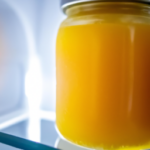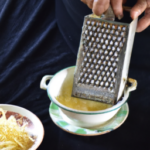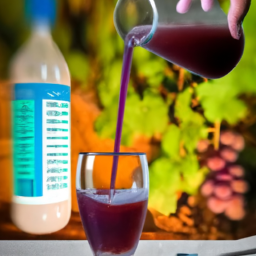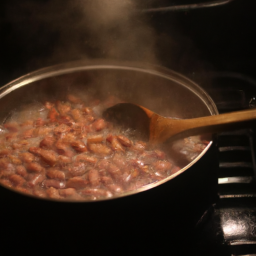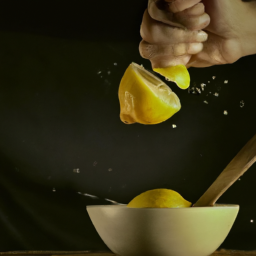I really love adding ginger to my meals and drinks because of its unique flavor and potential health benefits. However, I often end up with extra ginger and wonder how long ginger juice can last in the fridge. As someone who values food safety and efficiency, I decided to research the factors that affect the shelf life of ginger juice and share my findings.
Several factors can influence how long ginger juice can last in the fridge, including the freshness of the ginger root, the preparation method, and how it’s stored. By understanding these factors, we can make informed decisions about how to handle our ginger juice and minimize waste.
In this article, I’ll explore the science behind ginger juice shelf life and provide practical tips for extending its freshness. Whether you’re a seasoned ginger enthusiast or a curious beginner, you’ll find valuable information to help you get the most out of your ginger juice.
Key Takeaways
- Proper storage is essential for maximizing the shelf life of ginger juice, and factors such as preservation method, temperature, and freshness of ginger root can all impact its longevity.
- Ginger juice can be stored in the fridge for up to one week, but signs of spoilage such as changes in color, texture, and smell should be monitored.
- To extend the shelf life of ginger juice, it can be frozen in ice cube trays for up to six months, or natural preservatives such as lemon juice or honey can be added.
- Repurposing expired ginger juice in homemade beauty recipes or other culinary applications is a sustainable way to minimize waste and contribute to a healthier planet.
Factors Affecting the Shelf Life of Ginger Juice
Hey folks, wanna know how long your ginger juice will last in the fridge? Let’s talk about the factors that affect its shelf life!
One of the most important factors that determines the longevity of ginger juice is the method of preservation. The juice can be kept fresh for a longer period by using methods such as pasteurization, freezing, or canning. Pasteurization involves heating the juice to a high temperature and then quickly cooling it down to prevent the growth of bacteria. Freezing and canning also have a similar effect of eliminating bacteria, thus extending the shelf life of the juice.
Another crucial factor that affects the shelf life of ginger juice is the impact of temperature. The juice should be kept at a constant temperature of 40°F or below to prevent bacterial growth. If the juice is stored at a higher temperature, it can cause the growth of bacteria, which can result in spoilage. Therefore, it’s essential to store ginger juice at the right temperature to prevent any detrimental impact on its shelf life.
With these two factors in mind, let’s now move on to discussing the freshness of ginger root.
Freshness of Ginger Root
When it comes to making ginger juice, the freshness of the ginger root is crucial. I’ve learned, as someone who has experimented with juicing ginger, that knowing how to choose fresh ginger and identifying signs of spoilage is important.
Fresh ginger should have a firm texture, a smooth skin, and a spicy aroma.
Signs of Spoilage
The signs of spoilage for ginger juice include changes in color, texture, and smell. When ginger juice starts to spoil, its color may become darker or cloudy, and its texture may become thicker or slimy. Additionally, its smell may become sour or unpleasant. These changes are indicators that the ginger juice is no longer fresh and should not be consumed.
To avoid spoilage and extend the shelf life of ginger juice, it is important to follow proper storage techniques. Ginger juice should be stored in a clean, airtight container in the refrigerator. It should not be left at room temperature for prolonged periods of time, as this can encourage the growth of common contaminants such as bacteria and mold. By storing ginger juice properly, it can last for up to two weeks in the refrigerator.
When it comes to choosing fresh ginger to make ginger juice, there are a few things to keep in mind.
How to Choose Fresh Ginger
To ensure you get the best flavor and quality for your ginger juice, it’s important to know what to look for when choosing fresh ginger. Here are some tips to help you choose the best ginger:
-
Look for ginger with smooth, taut skin. Avoid any ginger with wrinkled or soft spots, as this could indicate decay.
-
Check for a fresh aroma. The stronger the scent, the fresher the ginger.
-
Consider the texture. Ginger should feel firm and heavy for its size.
Not only is ginger a flavorful addition to many dishes, it also has numerous health benefits. Ginger has been shown to have anti-inflammatory properties, and may help with digestion and nausea. Incorporating ginger into your diet can offer a range of health benefits, while also adding a unique flavor to your culinary applications.
When it comes to preparing ginger juice, it’s important to start with fresh ginger to ensure the best flavor and quality.
Preparation of Ginger Juice
If you’re looking to make some homemade ginger juice, all you need is fresh ginger, water, and a blender. Start by peeling and chopping the ginger, then blend it with some water until smooth. Once blended, pour the mixture through a fine mesh strainer or cheesecloth to separate the liquid from the pulp. Now, you have a refreshing ginger juice ready to use in your favorite drinks or recipes! If you’re wondering how to juice ginger root efficiently, this method ensures maximum flavor with minimal effort.
Strain the mixture through a fine-mesh sieve or cheesecloth, and you’ll have fresh ginger juice that can be used in a variety of recipes or enjoyed on its own. Ginger juice has numerous health benefits, including anti-inflammatory and antioxidant properties. It can also help with digestion and nausea, and may even have anti-cancer effects.
There are many ginger juice recipes available online, ranging from simple ginger shots to more elaborate mixtures with other fruits and vegetables. Once you’ve made your ginger juice, it’s important to store it properly to ensure its freshness and potency.
Storing Ginger Juice
Storing your homemade ginger juice properly ensures that you can preserve its nutrients and enjoy its health benefits for several days. It is best to store the juice in an airtight container in the refrigerator. This will help prevent any bacterial growth and maintain the freshness of the juice.
If you want to keep your ginger juice for an extended period, you can also freeze it. Pour the juice into ice cube trays and freeze it. Once frozen, transfer the cubes to a freezer-safe container. Frozen ginger juice can last for up to six months. When you’re ready to use the juice, simply thaw the cubes in the refrigerator or at room temperature.
With proper storage, your ginger juice will stay fresh and nutritious. However, it’s important to note that the longer the juice sits, the more its potency decreases. So, how long can ginger juice last in the fridge? Let’s explore in the next section.
How Long Can Ginger Juice Last in the Fridge?
You probably can’t wait to toss out that container of forgotten, neglected ginger elixir sitting in the back of your fridge. But before you do, let’s talk about how long ginger juice can actually last in the fridge. Ginger juice can be stored in an airtight container in the fridge for up to one week.
To ensure that your ginger juice stays fresh for as long as possible, it’s important to keep it refrigerated at all times. Ginger juice is packed with nutrients and has many health benefits, including anti-inflammatory properties and aiding in digestion. It can also be used in a variety of recipes, including smoothies, marinades, and salad dressings. So, don’t let that container go to waste! There are plenty of delicious recipes using ginger juice that you can try out.
Now, you may be wondering how to tell if ginger juice has gone bad. In the next section, we’ll discuss some tips on how to determine if your ginger juice has spoiled.
How to Tell if Ginger Juice Has Gone Bad
Imagine taking a sip of your refreshing ginger elixir and tasting a sour, funky flavor- that’s a sure sign that your ginger juice has gone bad. But how do you know if your ginger juice is still safe to consume? Here are three indicators that your ginger juice has gone bad:
-
A change in color: Fresh ginger juice has a bright, golden hue. If you notice that your ginger juice has become darker or cloudy, it’s a sign that it has started to spoil.
-
Off-putting smell: Fresh ginger juice has a pungent, spicy aroma. If your ginger juice smells sour or has a strange, musty odor, it’s time to toss it out.
-
Unpleasant taste: Spoiled ginger juice will have a sour, funky, or bitter taste. If you notice any strange or off flavors, it’s best to discard the juice and start fresh.
Now that you know how to tell if your ginger juice has gone bad, what do you do with it? Don’t throw it away just yet! Spoiled ginger juice can still be used in culinary applications, such as marinades or dressings. Alternatively, you can perform a DIY ginger juice expiration test by adding a small amount of the juice to hot water. If the ginger juice still has its signature spicy flavor and aroma, it’s safe to consume.
To extend the shelf life of ginger juice, there are a few tips you can follow. One of the most important things to keep in mind is to store your ginger juice in an airtight container in the refrigerator. Additionally, adding a small amount of lemon juice or vinegar to your ginger juice can help to preserve it for a longer period of time.
With these tips, you can enjoy your ginger juice for longer and avoid any unpleasant surprises.
Tips for Extending the Shelf Life of Ginger Juice
Now that we know how to tell if ginger juice has gone bad, let’s talk about how we can extend its shelf life. The good news is that there are alternative preservation methods that can help keep your ginger juice fresh for longer.
One way to do this is to freeze the ginger juice in ice cube trays and then transfer the cubes to a freezer-safe container. This method allows you to use small amounts of ginger juice at a time, without having to thaw the entire container each time you need some. The frozen ginger juice cubes can easily be added to smoothies, teas, or even soups for an extra kick of flavor. Similar to how you might prepare ginger juice, you can also make orange juice from concentrate by mixing the frozen concentrate with water for a refreshing beverage. Both methods offer a convenient way to preserve ingredients while minimizing waste.
Another way to extend the shelf life of ginger juice is to add a bit of lemon juice or honey to it. These ingredients have natural preservative properties that can help keep the ginger juice fresh for a longer period of time.
It’s important to note that even with these preservation methods, ginger juice will eventually go bad, so it’s best to use it within a few weeks of making it. If you find that you have leftover ginger juice that has gone past its expiration date, don’t worry! There are still plenty of recipes that you can make with it, which we’ll explore in the next section.
Uses for Expired Ginger Juice
If you’ve ever found yourself with expired ginger juice, don’t throw it away just yet! While it may not be suitable for consumption, there are still alternative uses for old ginger juice that can be beneficial. For example, ginger juice can be used in various homemade beauty recipes due to its anti-inflammatory and antioxidant properties.
One recipe includes using ginger juice as a face mask. Simply mix expired ginger juice with honey and apply it to your face. Leave it on for 15-20 minutes before rinsing off with warm water. Another alternative use for old ginger juice is to add it to a foot soak. The anti-inflammatory properties of ginger can help soothe sore and tired feet. Mix expired ginger juice with warm water and soak your feet for 15-20 minutes. As you can see, there are many useful ways to repurpose expired ginger juice instead of throwing it away.
| Column 1 | Column 2 | Column 3 | Column 4 | Column 5 |
|---|---|---|---|---|
| Waste | Repurpose | Environment | Creativity | Sustainability |
| Negative | Positive | Consciousness | Innovation | Responsibility |
| Harmful | Beneficial | Green Living | Resourcefulness | Ethical |
| Disposal | Innovation | Climate Change | Ingenuity | Eco-Friendly |
| Garbage | Upcycling | Carbon Footprint | Adaptability | Conservation |
This table highlights the emotional impact of wasting versus repurposing expired ginger juice. By choosing to repurpose, individuals can positively impact the environment, demonstrate creativity, and practice sustainability. On the other hand, wasting can lead to negative consequences such as harmful disposal methods, increased carbon footprint, and lack of responsibility towards the environment. By showcasing the benefits of repurposing expired ginger juice, individuals can feel inspired to make conscious choices that align with their values and contribute to a healthier planet.
Frequently Asked Questions
Can ginger juice be frozen for longer shelf life?
Yes, freezing ginger juice can preserve its flavor for a longer shelf life. When stored properly in an airtight container, ginger juice can be frozen for up to 6 months without losing its quality.
Is it safe to consume expired ginger juice?
Consuming expired ginger juice is not safe and poses health risks. It’s like playing with fire, risking burns. It’s important to follow storage guidelines and discard expired products to ensure safe consumption.
How often should ginger juice be stirred or shaken in the fridge?
To prevent oxidation, I stir my ginger juice once a day in the fridge. This helps to distribute the natural oils and prevent spoilage. It’s important to consume within a few days for freshness.
Can ginger juice be stored in a plastic container?
Yes, ginger juice can be stored in a plastic container, but glass containers are better alternatives. To extend the shelf life, adding lemon juice or apple cider vinegar can help. Stirring or shaking is not necessary, but refrigeration is required.
Can ginger juice be mixed with other ingredients for a longer shelf life?
To increase ginger juice preservation and shelf stability, I’ve found that adding lemon juice and honey works well. However, it’s important to store the mixture in a glass container in the fridge for optimal freshness.
Conclusion
In conclusion, ginger juice can last for up to two weeks in the fridge, depending on various factors such as the freshness of the ginger root, how it was prepared, and how it was stored. It’s important to always check for signs of spoilage before using ginger juice, such as mold, discoloration, or an off smell. To maximize its shelf life, storing ginger juice in an airtight container is recommended, and freezing can further extend its usability. When it comes to other juices, it’s also helpful to know how long orange juice lasts, as fresh-squeezed varieties typically remain good for only a few days in the fridge. As with ginger juice, always inspect orange juice for signs of spoilage before consuming.
To extend the shelf life of ginger juice, it’s recommended to store it in an airtight container and to use fresh ginger root. As the famous adage goes, "an ounce of prevention is worth a pound of cure."By taking proper precautions when preparing and storing ginger juice, you can ensure that you have a fresh and flavorful ingredient to use in your recipes.
So go ahead and experiment with ginger juice in your cooking, knowing that with a little care, it can last for a decent amount of time in the fridge.
Cindy thoroughly researches juicing trends, techniques, and recipes to provide readers with practical advice and inspiration. Her writing style is accessible, engaging, and designed to make complex concepts easy to understand. Cindy’s dedication to promoting the advantages of juicing shines through her work, empowering readers to make positive changes in their lives through the simple act of juicing.




